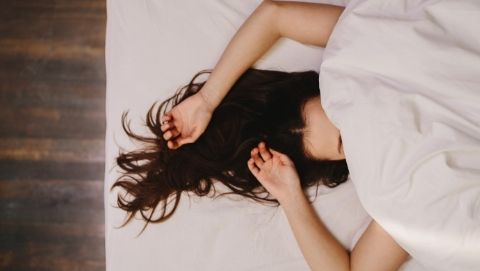Daylight Saving Time: Sleep Health & Tips
By Professional Practice Extension Assistant Professor, Ashley Yaugher & Emma Campbell

Healthy and consistent sleep can be hard to achieve with how busy our lives can get. And with daylight saving time occurring on Sunday, March 14th, this can make getting enough sleep feel impossible. During spring, daylight saving time clocks go forward one hour at 2 a.m. jumping ahead to 3 a.m. With that jump in time, it has been found that, on average, people get 40 minutes less sleep the day after daylight saving time in March than any other day of the year (Pacheco, 2020).
Luckily even with daylight saving time, there are ways to help yourself gain more and better sleep; try some of the tips below for better sleep.
Tips for Better Sleep:
- Have a consistent sleep schedule. Set a bedtime and wake-up time that you stick to consistently. The sleep schedule you make should ideally consist of at least seven hours of sleep. A tip to help you keep your sleep schedule during the springtime change is to adjust your current sleep schedule by waking up 15 to 20 minutes earlier, a few days before daylight saving time (Pacheco, 2020).
- Stay off of your devices before bed. Though it may be tempting to watch videos or scroll through social media before you fall asleep, you should stay off of your electronic devices. Using electronics when trying to fall asleep will make it harder to fall asleep, and the light will disturb your body’s natural melatonin function, known as the sleep hormone (Bertisch, 2020).
- Have a bedtime routine you follow. Bedtime routines help you relax before you go to sleep. This can consist of anything that helps wind you down from the day; write in a journal, practice meditation, or have a skincare routine each night (Gaines, 2016).
- Stay away from caffeine and alcohol before bed. Contrary to popular belief, alcohol does not help people sleep well; it may help people fall asleep, but it also decreases sleep quality (Gaines, 2016). An alternative to drinking alcohol before bed to help you sleep is herbal tea; just make sure it is not caffeinated.
- Exercise during the day. How we treat ourselves throughout the day plays a significant role in how we sleep at night. Exercising during the day helps us lower stress and have a better mood, plus it helps us sleep better at night (Bertisch, 2020).
Conclusion:
Better sleep is achieved differently for everyone, so it can be useful to try new things and see what helps you get a healthy night’s sleep. With time changes, better sleep is even more important. A good night’s sleep can make a difference in how your whole day goes, so it is imperative to find a healthy sleep schedule that works for you. You can create a sleep routine with the tips above and for more, check out the resources below.
Resources
- CDC – Basics About Sleep
- USU Extension AWARE – Improve Sleep
- USU Extension – Ask an Expert – Improve Sleep
References
- Bertisch, S. (2020, May 15). Strategies to promote better sleep in these uncertain times. Retrieved February 22, 2021, from https://www.health.harvard.edu/blog/strategies-to-promote-better-sleep-in-these-uncertain-times-2020032719333
- Gaines, K. K. (2016). Sleepless in America: Burning the Candle at Both Ends? At What Cost? Urologic Nursing, 36(3), 109–110. Https://doi-org.dist.lib.usu.edu/10.7257/1053-816X.2016.36.3.109
- Pacheco, D. (2020, October 27). Daylight saving time - how time change affects sleep. Retrieved February 22, 2021, from https://www.sleepfoundation.org/circadian-rhythm/daylight-saving-time#:~:text=Gradually%20Alter%20Your%20Bedtime%3A%20Two,an%20additional%2015%2D20%20minutes.


 Utah 4-H & Youth
Utah 4-H & Youth